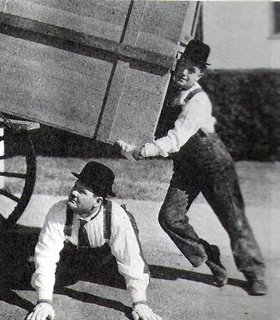Who do you trust?
 I received an email message from the E.F. Schumacher Society this morning that begins with a reminder that "The only energy source that we have complete control over is that of the human." The message urges us not to forget the value of human energy as it relates to "our ability to work and to draw sustenance from the lands around us."
I received an email message from the E.F. Schumacher Society this morning that begins with a reminder that "The only energy source that we have complete control over is that of the human." The message urges us not to forget the value of human energy as it relates to "our ability to work and to draw sustenance from the lands around us."There is, of course, another kind of human energy that is an essential part of the equation leading to a sustainable and just society. It is called social capital and it is based on community, cooperation and trust.
During all its years in publication, "The Whole Earth Catalog" was only able to find one book that examined the concept of "trust". Just one. Francis Fukuyama, perhaps best known for his bestselling "The End of History" has written it. It's entitled "Trust: The Social Virtues & The Creation of Prosperity"and was published in 1995.
In writing "Trust" Fukuyama sought to "divine the hidden principles that make good and prosperous society." What he discovered challenged basic assumptions of both conservatives and liberals. "If Marxist economics undervalued the role of individual choice in a market economy," He writes. "neoclassical economics goes too far in the other direction, promoting a radical individualism that neglects the moral basis of community and ignores the many 'irrational' factors that influence economic behavior."
Fukuyama's basic premise is that the social capital of a given country (or area within a country) defines how its economy functions. He defines social capital as "the ability of people to work together for common purposes in groups and organizations.
"We often take a minimal level of trust and honesty for granted and forget that they pervade everyday economic life and are crucial to its smooth functioning...It is easier to appreciate the economic value of trust if we consider what a world devoid of trust would look like. If we had to approach every contract with the assumption that our partners would try and cheat us if they could, then we would have to spend a considerable amount of time bulletproofing the document to make sure that there were no legal loopholes by which we could be taken advantage of." (GW)
"Whereas physical capital refers to physical objects and human capital refers to the properties of individuals, social capital refers to connections among individuals – social networks and the norms of reciprocity and trustworthiness that arise from them. In that sense social capital is closely related to what some have called “civic virtue.” The difference is that “social capital” calls attention to the fact that civic virtue is most powerful when embedded in a sense network of reciprocal social relations. A society of many virtuous but isolated individuals is not necessarily rich in social capital.
Social capital refers to the institutions, relationships, and norms that shape the quality and quantity of a society's social interactions... Social capital is not just the sum of the institutions which underpin a society – it is the glue that holds them together.

0 Comments:
Post a Comment
<< Home